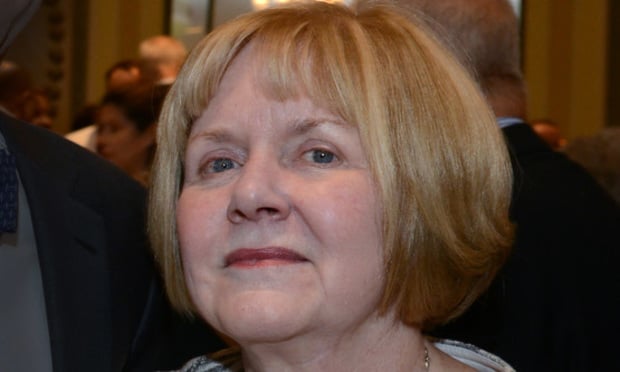Ex-Judge Jones Appointed Special Master Overseeing Cohen Privilege Review
A 17-year veteran of the Southern District of New York, Bracewell partner Barbara Jones was tapped Thursday to handle the review of privilege claims by President Donald Trump, the Trump Organization and Trump's personal attorney, Michael Cohen.
April 26, 2018 at 03:52 PM
6 minute read
 Barbara Jones. Photo Credit: Rick Kopstein
Barbara Jones. Photo Credit: Rick Kopstein Former Manhattan federal judge and current Bracewell partner Barbara Jones was appointed the special master to review the material seized from the offices and home of Michael Cohen, President Donald Trump's personal lawyer, by U.S. District Judge Kimba Wood of the Southern District of New York Thursday.
Jones served in the Southern District as a district judge from 1995 to her retirement in 2013. She previously served as a federal and state prosecutor in Manhattan. She handles white-collar matters for the firm, and she, along with a representative for Bracewell, could not immediately be reached for comment.
Wood's tapping of Jones settled, for now, the process by which Cohen and the Trump intervenors—attorneys for the president himself, as well as the Trump Organization—will get to review material seized by the government for privilege. It was seen as a win for Cohen and the Trump attorneys: If the government had its way, a special taint or filter team would have had sole authority to take the first cut at the material for potential privilege issues.
While Wood said she would leave substantial aspects of the process up to Jones, Wood did lay out the initial process the matter would now take going forward.
The government would continue to digitize the material it seized from Cohen's home and offices, to put together in a kind of master database. Assistant U.S. Attorney Thomas McKay said the government had three kinds of material it had identified. The first was hard files, that included eight boxes that would soon be made available to the other parties.
The second was electronic material, such as hard drives from computers, that will most likely be produced to counsel by the end of next week. The final set of material, cellphones and an iPad, were expected to take a bit longer. McKay said that two BlackBerry devices and an iPhone were expected to take extra time to extract—the iPhone in particular could take over 100 days, according to McKay.
Under the plan, materials would be produced on a rolling basis, with the first batch already in the hands of Cohen's attorneys. The same material must now also be produced for the special master, whose team would work on a parallel path to review items for potential privilege.
Meanwhile, Cohen's team would review and provide to the Trump teams any material that related to their clients. They then would review that material for potential privilege issues that they could choose to bring to Jones. Cohen likewise will be reviewing privilege on his end, between himself and his attorneys identified in previous court documents, such as his counsel on Thursday, McDermott Will & Emery partner Stephen Ryan.
From there, Wood said much of how the privilege claims were to be dealt with will be in Jones' hands. While she said she did not want the parties to produce privilege logs in favor of “useful” descriptions of claimed documents to allow the taint team to challenge, Jones would be empowered to decide the best process in consultation with the parties.
Wood made it clear she expects the process would remain operating at a good clip. She specifically alerted the parties that use of third-party contract attorneys—something that appeared directed at Trump's counsel at Spears & Imes, which alerted the court earlier it intended to contract with an e-discovery and legal tech vendor—would “probably not be efficient.”
At that point, Cohen's attorney Ryan rose and alerted the court that in-house staff would indeed be used by McDermott Will.
“I promise you I'm picking the smartest ones,” he assured the court during one of the hearing's moments of levity. Wood quipped that she would have to seal that portion of the transcript to keep members of the firm from seeing his remarks.
There were also moments of friction on display—and not between the government and the other parties. At one point, Spears & Imes partner Joanna Hendon, who leads the president's legal team, rose to address the government's desire to have the taint team also have access to the trove of materials—an issue that appears will fall to Jones—she was interrupted by Ryan. Cohen's attorney, clearly irritated, said he believed it was his turn to address the court.
After a brief moment of tense uncertainty over who would go next, during which Wood said she was just waiting to see who was going to win the battle for the floor, Ryan ceded the moment to Hendon who “seem[ed] insistent” on addressing the court again.
“As the privilege holder, I appreciate your courtesy, Mr. Ryan,” Hendon said, followed by a long pause before she continued. It was unclear if the exchange was prompted simply by a moment in a well full of attorneys looking to be heard, or by external issues arising between the Trump and Cohen legal teams.
One substantial issue raised by the government that will also have to be settled with Jones was that of how non-privileged material seized by the government will be handled. As he has throughout the proceedings, McKay suggested the concerns about privilege will ultimately come down to a small amount of material. On Thursday, he raised his concerns that the potentially bigger set of responsive material to the search warrant would fall into Jones' purview in a kind of “mission creep.”
McKay noted that the point of the special master was to address the relief sought by Cohen to not have the government taint team be the one's reviewing documents subject to attorney-client privilege. Responsiveness, he said, was an issue that traditionally would fall to the government “in any other case.”
“There's no reason to expand the scope of the special master,” McKay said.
Ryan voiced his concerns that the government seizure of nonresponsive material represented a privacy risk to Cohen, his family and others. He offered to flag material for the special master that he believed fell clearly outside the realm of potentially responsive material. This didn't sit well with the government, but McKay said if Jones conducted a kind of plain view standard for material it would be OK. But McKay also argued that responsiveness issues taken up by the special master would result in “dramatically delaying this process.”
Wood directed the parties to remain focused on the issue of privilege in their interactions with the special master, as “that's what brought us all here,” while leaving it up to Jones to initially address responsiveness issues if and when the parties raise them. She noted that she retained the power to intercede and communicate with Jones as she saw fit.
This content has been archived. It is available through our partners, LexisNexis® and Bloomberg Law.
To view this content, please continue to their sites.
Not a Lexis Subscriber?
Subscribe Now
Not a Bloomberg Law Subscriber?
Subscribe Now
NOT FOR REPRINT
© 2025 ALM Global, LLC, All Rights Reserved. Request academic re-use from www.copyright.com. All other uses, submit a request to [email protected]. For more information visit Asset & Logo Licensing.
You Might Like
View All

Family Law Practitioners Weigh In on Court System's New Joint Divorce Program

Former NY City Hall Official Tied to Adams Corruption Probe to Plead Guilty

New Charges Expected in Sex Trafficking Case Against Broker Brothers
Trending Stories
- 1ACC CLO Survey Waves Warning Flags for Boards
- 2States Accuse Trump of Thwarting Court's Funding Restoration Order
- 3Microsoft Becomes Latest Tech Company to Face Claims of Stealing Marketing Commissions From Influencers
- 4Coral Gables Attorney Busted for Stalking Lawyer
- 5Trump's DOJ Delays Releasing Jan. 6 FBI Agents List Under Consent Order
Who Got The Work
J. Brugh Lower of Gibbons has entered an appearance for industrial equipment supplier Devco Corporation in a pending trademark infringement lawsuit. The suit, accusing the defendant of selling knock-off Graco products, was filed Dec. 18 in New Jersey District Court by Rivkin Radler on behalf of Graco Inc. and Graco Minnesota. The case, assigned to U.S. District Judge Zahid N. Quraishi, is 3:24-cv-11294, Graco Inc. et al v. Devco Corporation.
Who Got The Work
Rebecca Maller-Stein and Kent A. Yalowitz of Arnold & Porter Kaye Scholer have entered their appearances for Hanaco Venture Capital and its executives, Lior Prosor and David Frankel, in a pending securities lawsuit. The action, filed on Dec. 24 in New York Southern District Court by Zell, Aron & Co. on behalf of Goldeneye Advisors, accuses the defendants of negligently and fraudulently managing the plaintiff's $1 million investment. The case, assigned to U.S. District Judge Vernon S. Broderick, is 1:24-cv-09918, Goldeneye Advisors, LLC v. Hanaco Venture Capital, Ltd. et al.
Who Got The Work
Attorneys from A&O Shearman has stepped in as defense counsel for Toronto-Dominion Bank and other defendants in a pending securities class action. The suit, filed Dec. 11 in New York Southern District Court by Bleichmar Fonti & Auld, accuses the defendants of concealing the bank's 'pervasive' deficiencies in regards to its compliance with the Bank Secrecy Act and the quality of its anti-money laundering controls. The case, assigned to U.S. District Judge Arun Subramanian, is 1:24-cv-09445, Gonzalez v. The Toronto-Dominion Bank et al.
Who Got The Work
Crown Castle International, a Pennsylvania company providing shared communications infrastructure, has turned to Luke D. Wolf of Gordon Rees Scully Mansukhani to fend off a pending breach-of-contract lawsuit. The court action, filed Nov. 25 in Michigan Eastern District Court by Hooper Hathaway PC on behalf of The Town Residences LLC, accuses Crown Castle of failing to transfer approximately $30,000 in utility payments from T-Mobile in breach of a roof-top lease and assignment agreement. The case, assigned to U.S. District Judge Susan K. Declercq, is 2:24-cv-13131, The Town Residences LLC v. T-Mobile US, Inc. et al.
Who Got The Work
Wilfred P. Coronato and Daniel M. Schwartz of McCarter & English have stepped in as defense counsel to Electrolux Home Products Inc. in a pending product liability lawsuit. The court action, filed Nov. 26 in New York Eastern District Court by Poulos Lopiccolo PC and Nagel Rice LLP on behalf of David Stern, alleges that the defendant's refrigerators’ drawers and shelving repeatedly break and fall apart within months after purchase. The case, assigned to U.S. District Judge Joan M. Azrack, is 2:24-cv-08204, Stern v. Electrolux Home Products, Inc.
Featured Firms
Law Offices of Gary Martin Hays & Associates, P.C.
(470) 294-1674
Law Offices of Mark E. Salomone
(857) 444-6468
Smith & Hassler
(713) 739-1250






